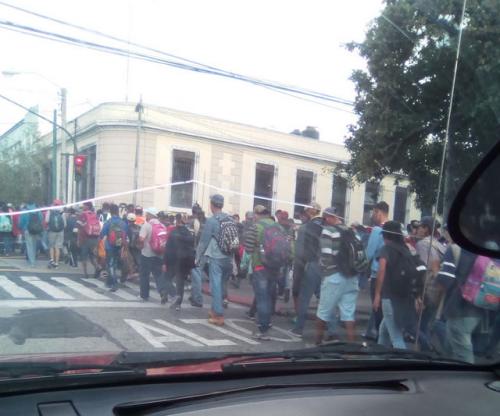The hidden cause of the migratory flow to the United States
- Opinión

The government of the United States has recently demanded that Mexico militarize its frontier with Guatemala and increase its agricultural imports from the United States, all this with a threat of increasing tariffs by 25% on Mexican products that enter the US market.
From the 1990s, the US has been utilizing trade as an instrument of economic subjugation and vassalage with their neighbours to the South. First it was the so-called North American Free Trade Agreement (NAFTA), between the United States, Canada and Mexico, signed in 1994; for this negotiation they elaborated the matrix of later agreements of economic vassalage that, with the label of “free trade”, the United States imposed on its Latin American neighbours. Then there was a failed attempt to impose it collectively under the acronym FTAA. In the rejection of this snare, Chavez, Lula and Kirchner stood out.
The matrix of these identical agreements was designed to destroy the sovereignty and economic identity of the countries that sign, in favour of the big transnationals. The strategic objective of these agreements is to first destroy agriculture.
The agricultural products that the United States exports tend to be subsidized at levels that oscillate between 60-80%, so these agreements open the doors to the importation of products against which the poor peasant farmers cannot even remotely compete. For this reason, in the first three years, NAFTA triggered the uprooting of two million Mexican peasant farmers who had to migrate, first from the countryside to Mexican cities, which created serious problems of overload of services and precarious living conditions, leading to delinquency and insecurity. This situation then degenerated, by the year 2000, with a first wave of massive emigration from Mexico to the United States.
In 2004, the Central American Free Trade Agreement – CAFTA was signed between the United States and Costa Rica, Guatemala, Honduras, Nicaragua, El Salvador and the Dominican Republic. The countries where this first took force were those that the (US) Americans call the Northern Triangle (Guatemala, Honduras, El Salvador) and it is this region from which the migratory flow that Trump wants to contain is coming, hence the obligation to militarize the border with Mexico.
The destruction of other countries' agriculture is the main strategic reason why the United States invests so many billions in subsidizing its agricultural exports. There is one key axiom that those who conduct US foreign policy are well aware of: without food sovereignty, there is no sovereignty. That may be why the United States sometimes helps to establish socialist governments.
Too often Latin American socialists include in their program a very old-fashioned view of the distribution of wealth, understood as the distribution of land; and generally, as a policy issue, this distribution of land occurs in the very land that is most productive. This political error, so common among our socialist revolutionaries, responds to criteria that are closer to the physiocratic school (wealth comes from the land) of Quesnay (1758) than to modern economic realities, because now the accumulation of wealth occurs in the financial realm.
The confiscation of land in production causes imbalances in the productive chain, leading to shortages, which causes food dependency. We thus see how some unthinking socialists end up opening trade opportunities to US food transnationals. The proof of this can be seen when we examine the items of exports from the United States to Cuba and Venezuela. To Cuba, exports are generally sent from New Orleans to disguise them. In the case of Venezuela, they are sometimes concealed by using Mexico as an intermediary stopover.
Trump's other demand to Mexico, to increase the import of US agricultural products, is unusual and the demand is due to the fact that China's retaliation during the trade war declared by the United States mainly affects the huge agricultural exports from the United States to China, and that has political repercussions in those states that are Trump's most important electoral base.
Almería 09/06/2019
(Translated for ALAI by Jordan Bishop).
Umberto Massei
Del mismo autor
- Bubbles, Dumping and Refugees 06/09/2021
- Burbujas, dumping y refugiados 06/09/2021
- Afghanistan for China 25/08/2021
- Afganistán para China 25/08/2021
- 1819 ideas for the XXI Century economy 05/08/2021
- The keys to Chinese successful economic growth 22/07/2021
- Las claves del crecimiento económico exitoso de China 22/07/2021
- Need for a New International Value benchmark 05/07/2021
- Nueva Referencia Internacional de Valor 30/06/2021
- Taiwan in the near future 17/06/2021
